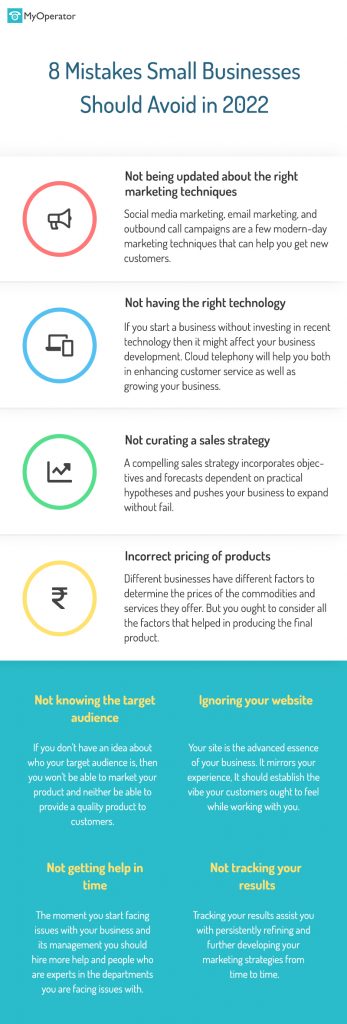“It takes 20 years to build a reputation and five minutes to ruin it. If you think about that, you’ll do things differently.” – Warren Buffett
Your small business is a beginning of a new journey that you are going to witness. But throughout this journey of building a reputation in the market, there are certain things you should consider if you want to grow on a higher scale. This requires a lot of effort and undeniable dedication. Even though making small slips during this journey is inevitable, here is a list of small business mistakes to avoid in 2022. Without wasting much time let’s get to it:

Not Updated about the right marketing techniques
One of the greatest marketing challenges is getting new customers, who contribute to your business revenues significantly. Knowing the right marketing and branding techniques or a small team regardless of whether they’re only a couple of individuals assists with building your business image. This warrants you’re both cementing your foundation and care for your clients.
Here are a few marketing techniques that your small business can adopt to grow:
Social media marketing
Social media is a boon for the marketing world as there are several ways through which you can market your products on social media.
- You can market your product for free by posting testimonials and product-related content.
- You can collaborate with several influencers to promote your products to their audience and integrate WhatsApp API for your business.
- You can also run paid ad campaigns to reach your TG audience.
Email marketing
Email marketing is another way that you can market your product and generate leads. As per the statistics, 81% of small businesses rely on email marketing as their primary customer email acquisition channel. Emails are a mode of async communication that means you do not have to poke your customer to reach out to them. You can even hire marketer to help you design attractive campaigns that bring in maximum ROI from email marketing.
Outbound calling campaigns
Many big brands use outbound calling campaigns to promote their products then why can’t you? Outbound calling campaigns are a smart and affordable way to market your product. You can tell your customers about your products, offers, and discounts through these campaigns. If you have a lean team then this is a perfect marketing solution for you as you wouldn’t have to do any manual work and they can focus on their other tasks.
Not owning cloud technology created specifically for small businesses
Technology has turned into a significant part of our lives. If you register a company and start a business without investing in the recent technology then it might dial back your business development. There are a lot of tools created specifically for small business owners keeping their budgetary constraints in mind. Did you know a lot of small business owners from tier 2 and tier 3 cities in India have already adopted cloud business communication tools to support their customer engagement efforts? You can get started with this cloud telephonic tool that includes call center tracking software, toll-free number services, IVR numbers to greet your customers without the aid of a receptionist, real-time call tracking to monitor your on-call performance, and so much more.
Not owning a sales strategy custom to your business goals
Everyone knows how important sales strategy is for any business. But they tend to overlook the fact that one strategy cannot work for all businesses. Not owning a sales strategy is one of the small business mistakes to avoid. You need to customize sales strategies as per your product or service. Use hit and trial methods to find out which strategy works the best for you. Here are a few examples of sales strategies that you can incorporate into your business:
Offer demonstrations
If you feel that your product is not getting enough attention, but you are confident that it will definitely add value to your customer’s life/business then you should start offering demos of your product or service. Customers are hesitant to try something new and invest their money in it. Giving free demos will remove that reluctance and would also attract them towards your product.
Cold-calling
Yes, cold-calling is still very relevant and prevalent in the sales world. There is nothing like having a one-to-one interaction with your prospects. Here are some articulate reasons that will further prove the aforementioned point:
- You can convey messages clearly through cold-calling. Confusion and chaos both can be avoided.
- You will get an instant reply from the customer.
- You will be able to judge your prospects’ intentions (if they are genuinely interested in your product or not) through their tone of voice.
- It is easier to present your pitch and convince a lead on a call than it is through text messages and emails.
Not being transparent about pricing
When are putting together your costs for a finished product, you must include the cost of raw materials, the time and effort involved, and profits (if at all possible). Do not price your product based on the costs set up by your competitors. What if they themselves are at loss? When they are hardly able to get back what they have invested how will you sustain by offering a further 10% discount on your products?
However, comparing with your competitors can also be useful. That will help you establish a perfect marketing plan as well as set the price of your product to what they are worth.
Different businesses have different factors to determine the prices of the commodities and services they offer. As aforementioned, it is important to consider all the factors that helped in producing the final product. Simply, considering the raw material cost and then further comparing it with your competitors will only put your business at loss.
Not engaging with your target audience
All the businesses are well aware of their target audience and their needs. But they get stuck when it comes to engaging that audience. It’s not a cakewalk to keep your target audience involved and interested in your business so here are a few tips that you can use to engage your audience more effectively:
- Make reader personas for your audience and then serve them content as per that through blogs and social media.
- Do surveys and polls with your audience about your customer service. Take their feedback regarding your product and also consider it.
- Add a call to action to all your content so they can find out more about you and what you offer. CTA also makes it easier for your customers to reach out to you.
- Run ad campaigns to keep them aware of the upcoming offers and new services.
- Give them discounts and coupons. For instance, you can give them 5% off on every third purchase they make from your business.
Ignoring your website
Another one of the small business mistakes to avoid in 2022 is ignoring your website. Your site is the advanced essence of your business. It mirrors your experience, if you have a website it does not establish the vibe your customers ought to feel while working with you. Then you should make the changes to it right away because you’re not just risking heading out potential clients, but you’re also hurting your SEO, which means you’ll drive less traffic from web crawlers over the long haul.
Here are some accepted procedures from Search Engine Journal for the optimization of your small business website:
- Keep your website URL clean and easy to remember.
- Ensure your site is versatile.
- Handle any technical issues with your site.
- Ensure your page load time is negligible to keep surfers on your site because naturally, no one would wait for your site to load. Everyone searching for instant results on the internet.
Make it a highlight put away some time consistently to check for broken connections and update website requisites like your contact data and working hours if necessary. Hire an SEO expert to help you with checking for specialized SEO issues consistently and make it a task to update your website with anything upcoming or new offers to keep your customers up-to-date with your business.
Not getting help on time
Small businesses tend to assume that since they are functioning on a smaller stage they do not need any help. Numerous entrepreneurs do as such in light of the fact that they are talented and can handle their business well on their own. Yes, you are very talented, nobody is doubting your capabilities. But do not ignore the fact that it is humanly impossible to do all things on your own. One of the small business mistakes to avoid is not getting help on time.
The moment you start facing issues with your business and its management you should hire more help and people who are experts in the departments you are facing issues with. Hire advisors and salespeople to deal with sales and advertising, and also someone to manage all the chores in your absence. A small team of experts is not a luxury but a necessity for your business.
Authority issues, bookkeeping/accounting issues, and everyday tasks are the three significant issues that small business owners like to take on themselves and think they can handle on their own. But these are the issues that need the most amount of proficiency.
The probability is that these three things are your most fragile connection, so if you don’t have an accomplice who is an expert in these departments, be ready to look for help quickly. Ideally, you should do this hiring before you start your business.
So start hiring help now if you haven’t already!
Not tracking results
Next in the list of small business mistakes to avoid is not tracking your results. It is a common mistake committed by most small business owners- they do not track the results of their marketing campaigns. And they’ll keep on putting resources into advertising strategies/campaigns without knowing whether or not they’re powerful or bringing you business.
If you are still investing in your old marketing efforts without measuring the impact of what you have done then you are just tossing your dollars for nothing. Moreover, tracking your results assist you with persistently refining and further developing your marketing strategies from time to time. So, track the results of not just your marketing campaigns but also the sales practices that you are following and all the other initiatives that you have taken up for the growth of your business.
A small business venture is not a task that one can perform individually. It takes the difficult work of a team. You need to learn a lot including how to make business-savvy choices. If you have done your required research then you are already ahead of your competitors.
Your small business will be having a journey of its own. You need to be there to invest in it, witness it, and finally, help it reach the pinnacle you have always wanted it to. Just keep in mind the above-mentioned small business mistakes to avoid and you are good to go.
 Scale your campaigns with 60% off on WhatsApp solutions.
Scale your campaigns with 60% off on WhatsApp solutions.




